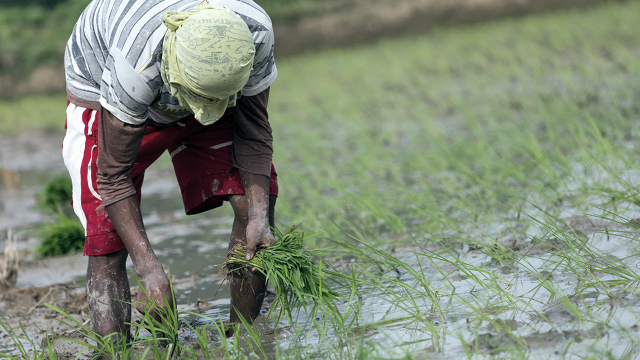
I was born and raised in a poor rural farming community in North Cotabato, Philippines. Every morning as I go to school, I can see farmers working on their rice fields. Under the scorching sun, with bodies bent toward the soil, they carefully plant rice. In the afternoon, as I walk my way home, I can see some of these farmers buying one to two kilos of rice – with either dried fish or canned sardines packed altogether in a plastic bag. They’re going home after the long, tiring day.
Farmers face a lot of challenges everyday – expensive farm supplies, new breed of pests, very small to no return of investment, little support from the government and other relevant sectors, and climate change.
Ironically, many of these food producers belong to the country's poorest sectors and are vulnerable to hunger.
This scenario continues as a cycle not just in my community, but in many rural farming areas in the Philippines. Our team in Food SECURE Ph which focuses on the empowerment of farmers in rural poor communities discovered that the combined issues of food insecurity, poverty, and lack of empowerment contribute to this problem.
On the global context, studies project that the global population will reach 9 billion by 2050. This means that more resources will be needed to meet basic human needs: food, water, shelter.
Given this, there rises a need to do more with less. In agriculture, this will be the greatest challenge of our future farmers: how can we feed the hungry planet with less resources?
What if our farmers give up on being farmers? What if they’ll get tired of the same old ways? What if they’ll sell their farms for commercial use? What if they’ll not see the purpose of what they do anymore? What if they’ll give up on us?
What can be done to change these “what ifs”?
a. Invest on the needs of farmers
Our farmers in the Philippines need empowerment, appreciation, and support. They need access to quality and affordable farm supplies that can guarantee them good returns. They also need the knowledge, skills, and technologies to combat the present challenges of the changing climate.
Investment on the health of farmers, and financial and business literacy should also be a priority of our government and other stakeholders. Our farmers need to be healthy and business-minded to advance the agricultural sector.

b. Inclusive growth for smallholder farmers in rural areas
Smallholder farmers are very important in our food system. They will play a big role in feeding our hungry planet in the next decades to come. Most importantly in rural areas where the farms and farmers are full of potential.
With this, there’s a need of public and private partnerships with the smallholder farmers in rural areas. Businesses and government sectors should consider directly buying agricultural products from smallholder farmers, and not through middlemen. This will advance inclusive growth, rural development, and win-win partnerships.
c. Sustainable ecological agriculture
Agricultural development should not cost the imbalance of our ecosystem. Agriculture can contribute in lessening carbon footprint, and our farmers can play a big role in achieving this. Responsible use of agricultural resources like water, land, and chemicals can significantly decrease carbon footprint.
d. Focus on innovation
Innovations that can truly help our farmers should not be kept in laboratories or libraries. They should be brought to them in the field where the real problems are.
The scientific community working on agricultural innovations should also be fair on the price of their products and services. Affordable and efficient innovations can be the best way our farmers can use to advance agriculture, and also their quality of life.
e. No to food waste
Food waste is an insult to our farmers. Respecting our food by consuming what is enough for us is a way of respecting our farmers who worked hard to produce it.
Moreover, food waste is a global problem, and a challenge to sustainable development. Globally, around 1.3 billion tonnes of food are lost or wasted every year. This can actually feed the world’s hungry and food poor – including our farmers. So make sure your next meals will not contribute to this statistics.
f. Youth in agriculture
The average age of a Filipino farmer is 57. On an important note, the Filipino youth has little or no interest in agriculture. With ageing farmers and uninterested youth, how will the future of our agricultural sector look like?
The youth should be empowered to contribute to our agriculture sector. Scholarships in agriculture should be prioritized by relevant stakeholders. Youth, especially in rural farming communities should be empowered with advanced knowledge and skills in agricultural developments and innovations.
Let us not wait for the time when our farmers will give up on us.
It is time to rethink how each of us can help them, even in small ways. – Rappler.com
Christine Jodloman is the Founder of Food SECURE Ph – a start up that is working to provide rural farmers in North Cotabato a sustainable, healthy, and income-generating farm-to-fork lifestyle. This project has been awarded a grant as part of the Young Southeast Asian Leaders Initiative’s (YSEALI) Seeds for the Future initiative. Christine is also the first Filipino recipient of the Young Global Changers Scholarship, which is supported by the 2017 German G20 Presidency.